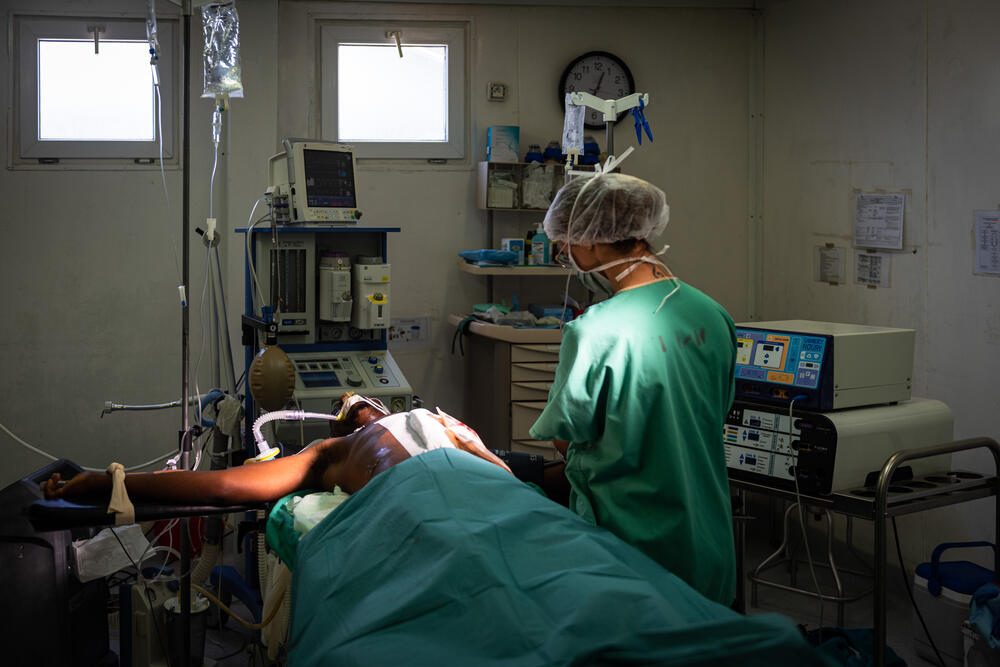Haiti: MSF teams treat spike in casualties as chaos engulfs Port-au-Prince
Médecins Sans Frontières / Doctors Without Borders (MSF) teams are launching a response in Port-au-Prince to care for the mounting number of people injured in the chaos that has engulfed the Haitian capital.
The current situation in the city follows the announcement on 28 February that general elections may be postponed until as late as August 2025.
In recent days, the violence has taken on a new dimension, causing an explosion in the number of casualties and triggering the government’s declaration of a state of emergency in Haiti.
Emergency care
Amid the further deterioration in the security situation, the number of wounded requiring treatment by MSF teams has risen sharply – many of them women, children and older adults.
"The 50 beds in our hospital in Tabarre have all been occupied since the beginning of February, but on 28 February the situation worsened and we had to increase the bed capacity to 75," said Mumuza Muhindo Musubaho, Head of MSF in Haiti.
"We are receiving an average of five to ten new cases a day, and we are working at the limits of our capacity."
While several local hospitals have stopped functioning, MSF has now reopened its emergency centre in the Turgeau district – two weeks earlier than planned – to increase medical activities and reduce pressure on its existing facilities.
On 4 March, MSF also opened its new hospital for the injured in the commune of Carrefour, with an operating theatre and 25 beds.
MSF is currently looking for additional hospitals where it could be possible to work in different areas of Port-au-Prince, as insecurity and improvised roadblocks are preventing ambulances from transporting patients.

Help us prepare for the next emergency
Thousands of people have fled their homes in recent days due to clashes in their neighbourhoods, while current high tensions have led MSF to temporarily suspend its mobile clinics in several sites.
Insecurity in Port-au-Prince has also contributed to an increase in sexual violence in recent years, and MSF teams fear that these figures will rise further as the number of displaced people continues to grow. Last year we provided care to over 4,000 survivors of sexual assault.
Low supplies
Many parts of the city are currently in the throes of violence, which is the culmination of a political, economic and social crisis that has plagued the country since the assassination of its former President Jovenel Moïse in 2021.
The country's main port is currently difficult to access due to tension and insecurity in most parts of the city. The international airport has also been closed for several days.
"We are also worried because our stock of medical supplies is extremely difficult to access, not only because of the situation at the port but also because it is impossible to continue with the administrative procedures for customs clearance," says Musubaho.
"We fear we will run out of medicines and medical supplies, which are absolutely essential to meet the enormous needs we are facing at the moment."
In late 2022, the country was virtually paralysed for weeks when a wave of demonstrations led to the declaration of "peyi lok" or "country lockdown". This hampered movement, economic activity, water and fuel supplies and forced many health facilities to suspend their activities.
Right now, Port-au-Prince's healthcare system is once again under enormous pressure and struggling to meet needs.
MSF in Haiti
More than a decade after Haiti's catastrophic 2010 earthquake, the country's healthcare system is on the brink of collapse amid an escalating political and economic crisis. There is a high level of chronic violence and insecurity, including armed clashes, robberies and kidnappings affecting people throughout the capital, Port-au-Prince.
